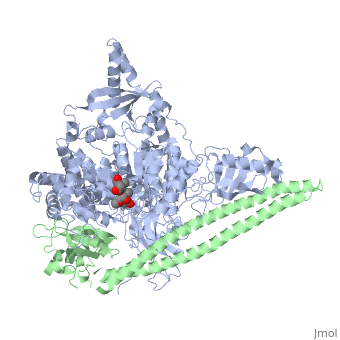The Akt signaling pathway or PI3K-Akt signaling pathway is a signal transduction pathway that promotes survival and growth in response to extracellular signals. Key proteins involved are PI3K (phosphatidylinositol 3-kinase) and Akt (protein kinase B). Protein kinase B (PKB), also known as Akt, is the collective name of a set of three serine/threonine-specific protein kinases that play key roles in multiple cellular processes such as glucose metabolism, apoptosis, cell proliferation, transcription, and cell migration. See also Signal transduction.
Activation Akt/PKB via Receptor tyrosine kinases/Ras
Ras activation
GTPase KRas
Allosteric modulation of H-Ras GTPase
Phosphoinositide 3-Kinases
Phosphoinositide 3-Kinases or phosphatidylinositol 3-kinase (PI3K) are a family of ubiquitously distributed lipid kinases, that play a critical role in the regulation of numerous cellular processes including cellular growth and morphology, programmed cell death, cell motility and adhesion, mitogenesis and glucose uptake.
PI3K can also be activated by G protein-coupled receptors (GPCRs), via G-protein βγ dimers or Ras which bind PI3K directly. In addition, the Gα subunit activates Src-dependent integrin signaling which can activate PI3K.
Phosphoinositide formation
The triphosphate form (PI(3,4,5)P3) binds Akt and phosphoinositide-dependent kinase 1 (PDK1) so they accumulate in close proximity at the membrane.
Akt/PKB
AKT1
RAC(Rho family)-alpha serine/threonine-protein kinase is an enzyme that in humans is encoded by the AKT1 gene. This enzyme belongs to the AKT subfamily of serine/threonine kinases that contain SH2 (Src homology 2-like) protein domains. See 3mv5.
AKT2
AKT2, also known as RAC-beta serine/threonine-protein kinase, is an enzyme that in humans is encoded by the AKT2 gene. It influences metabolite storage as part of the insulin signal transduction pathway. See 3d0e.

